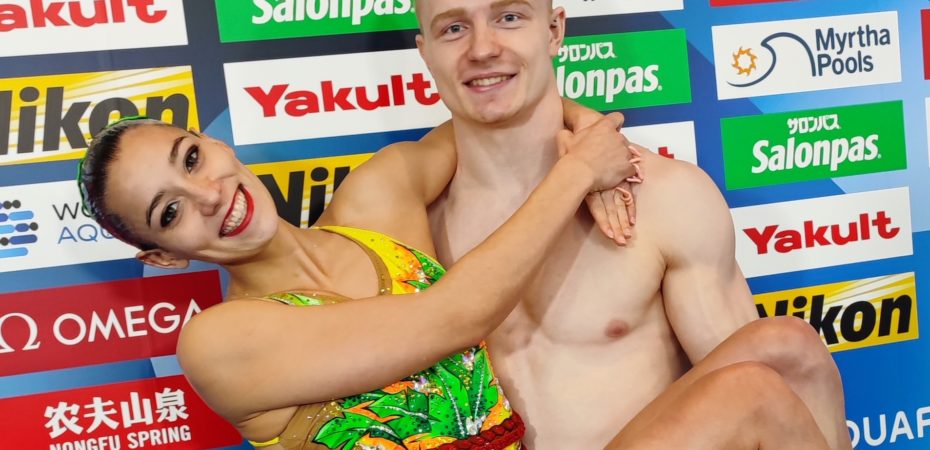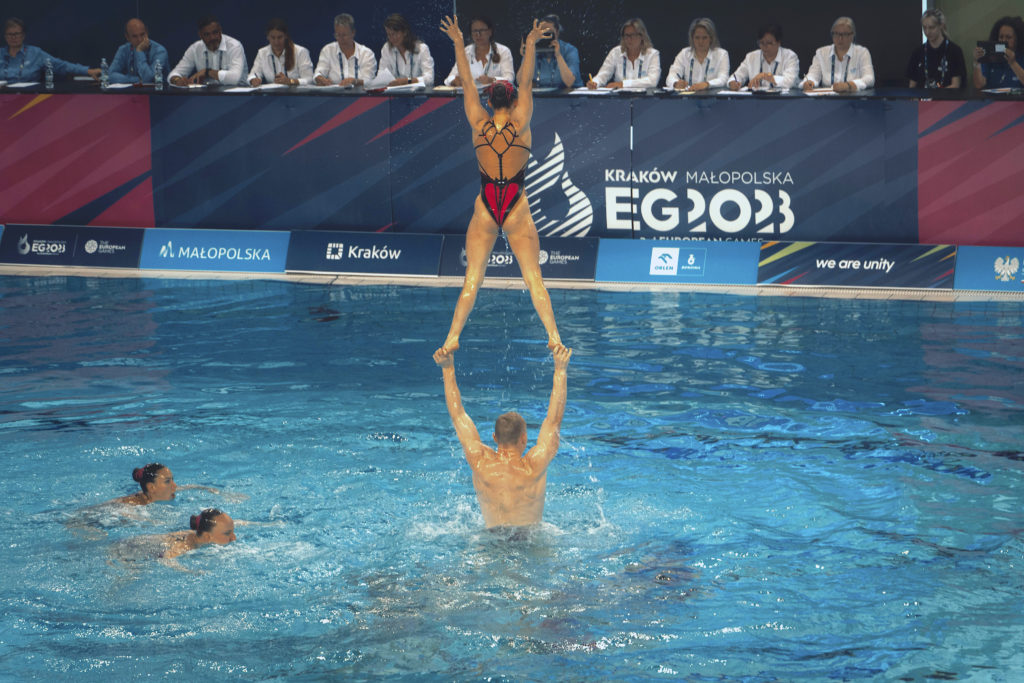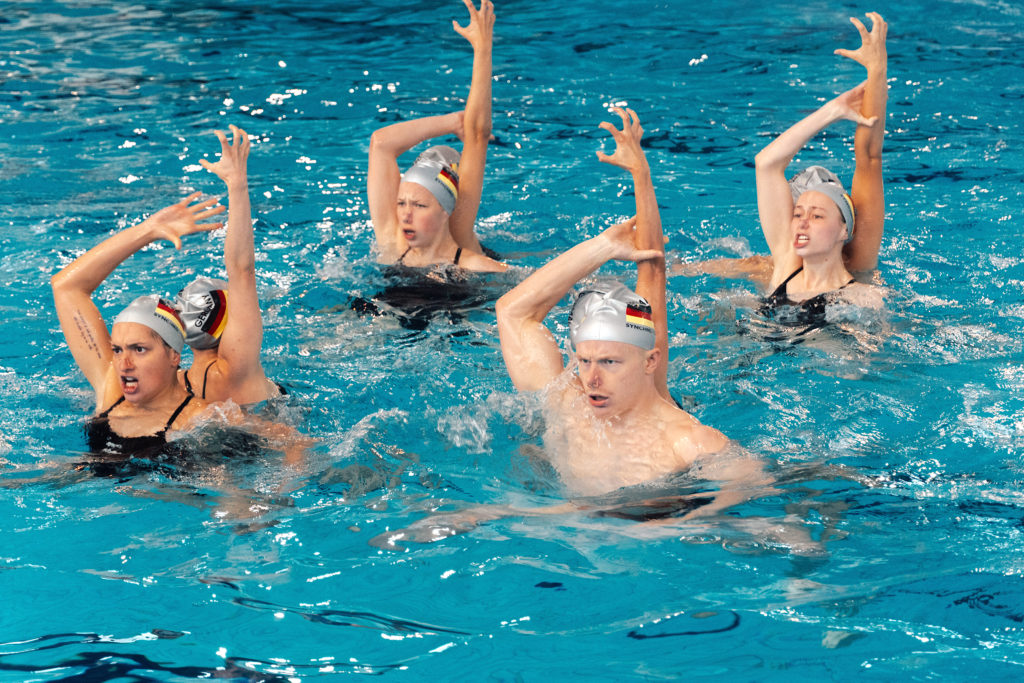Nothing destined Frithjof Seidel to become, in 2023, the first male artistic swimmer to win a medal in a team event at a senior European Championships.
He had taken up diving 20 years prior at the age of six, and had never looked back until recently. For nine years, Seidel represented Germany in major international competitions, whether they be European Championships, World Championships or the Summer Universiade. But in 2020, he found himself at a crossroads, understanding his diving career was nearing the end.
Thankfully, artistic swimming found him. Rather, Michelle Zimmer, who would eventually become his mixed duet partner, did. Two years later, Seidel made his international debut in the sport at the 2022 European Championships, placing fourth in free mixed duet.
The following year, the 26-year-old helped Germany win its first European team medal in 40 years, and forever etched his name in the history books in the process. A few weeks later, the team qualified to a World Championships final and by luck of draw, Seidel was also the first man to swim in a team routine at a senior World Championships.
Inside Synchro: Can you tell us more about how you started artistic swimming after spending many years competing in diving?
Frithjof Seidel: Back in 2020, Michelle [Zimmer] approached me, asking if there were any male athletes in my local diving club who would be interested in trying artistic swimming. She was looking for a male duet partner. At that point, I already knew that the season of 2020-2021 would be my last in diving. I felt like my performance development was stagnating, and diving wasn’t fulfilling anymore. Due to this, I decided to give artistic swimming a try.
After that, it was a smooth transition from one sport to another. Even though diving can be very graceful too, artistic swimming has broader ways to express feelings and emotions. In addition, I like the fact that each new routine offers the chance to tell a new story.
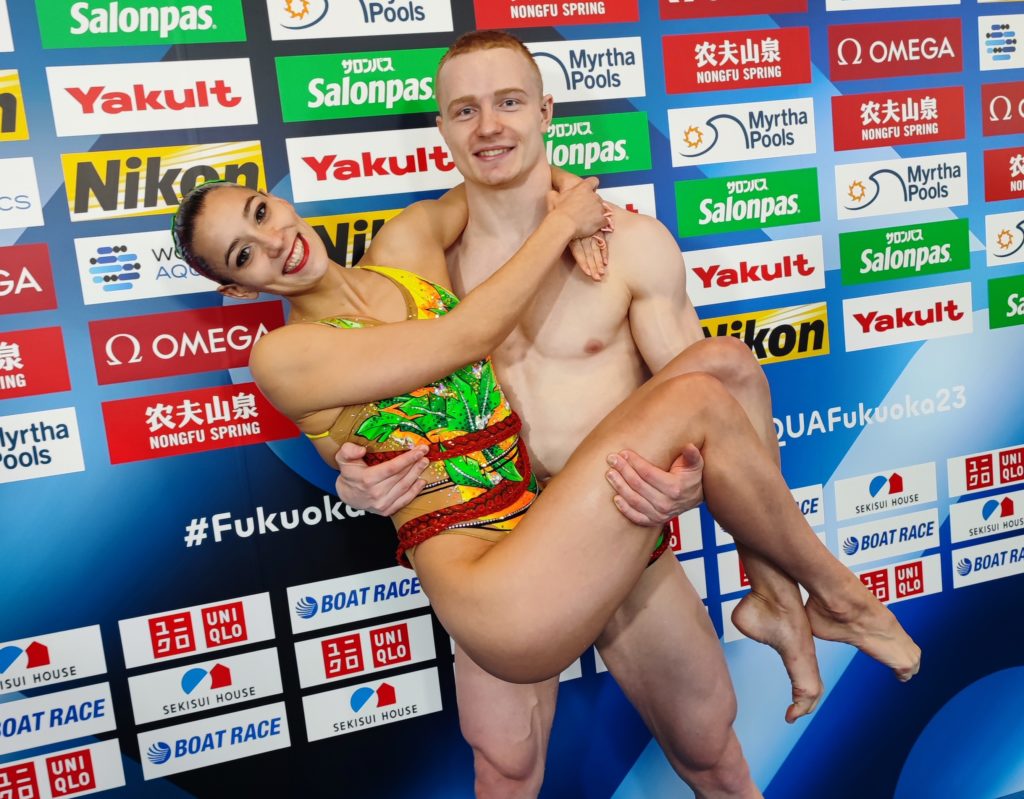
IS: Does your diving background help you in artistic swimming?
FS: Most of all, I benefit from many years of being a professional athlete in general – not diving in particular. I had a rough idea of which challenges I would be facing and how to cope with many of them. Nevertheless, I think that many years in diving added up to having well-developed body awareness and good coordination.
IS: What were some of the things you first struggled with going from one sport to another?
FS: I struggled with many different things, like holding my breath for a long time and making my body float. Coming from a sport in which the performance is only a few seconds long, I also had to work on my stamina and adapt my muscles to longer lasting activities. And it is still a long way to go! Some of these struggles will accompany me many more years.
Additionally, I had to learn that my body reacts differently to artistic swimming training. Actually, I do not know whether it was due to the new sport or to the fact that professional sports is way different if your body is 18 or 26 years old! That is how I learned to put more focus on recovery.
IS: How do you approach an artistic swimming competition compared to a diving competition?
FS: There is one major difference to diving. I needed to learn that the music sessions at the competition venue can be as nerve-wracking as the competition itself. Apart from that, I do approach these competitions in a similar way – sticking to my rituals and trying to focus on what we worked on in training.
IS: You made your international debut at the 2022 European Championships in Roma. How was that competition for you?
FS: I was really nervous. Coming into a new environment is always challenging as people tend to assess someone pretty fast. However, my team supported me a lot and I also liked being close to my former diving teammates at that competition. I had started the year only wanting to qualify for Europeans, and then to show our best possible performance at that point. We totally achieved that.
IS: In 2023, you also swam in the free combination routine for Germany at the European Championships (turned into an acrobatic routine for the World Championships). How did you adapt to training and competing in a team event?
FS: Being in a pattern of eight swimmers was quite a challenge for me at first, and I also struggled with some other deficits. Nevertheless, I totally enjoyed this opportunity. I am really thankful for the trust my coaches and teammates had in me. Besides, I also liked the fact that we managed to find ways to emphasize my strengths.
IS: Team Germany won silver in that event in 2023, so you became the first man to win a team medal in artistic swimming at a senior European Championships. How did that feel?
FS: I definitely needed some time to process what we achieved as it felt like a milestone for me in many different ways. Of course, regarding artistic swimming, it felt like a further step into the right direction of including male athletes in this sport. It also felt like a major achievement for the German team and for my other nine teammates. On a personal level, I fulfilled a dream that I never reached in 18 years of diving. I was really grateful.
IS: What was the media fallout afterwards in Germany? Do you think it helped more boys join artistic swimming?
FS: I wish I could say that we drew the attention of quite a few German media. But it was actually almost just me as I was the only man among many girls. To me, it felt like a dilemma. On the one hand, I felt like my female teammates, who have put in many more years of work than I have, did not get the attention they deserved. Especially since it was Germany’s first medal at the European Championships after 40 years, and we achieved it as a team of 10 athletes.
On the other hand, I wanted to use the platform I was given to promote the sport of artistic swimming itself as it is only a minor sport in Germany. I took every media request I received as I felt that any attention we could gain in German media would help the sport to grow, and therefore also make boys consider joining the sport. Nevertheless, I did not see any consequences yet.
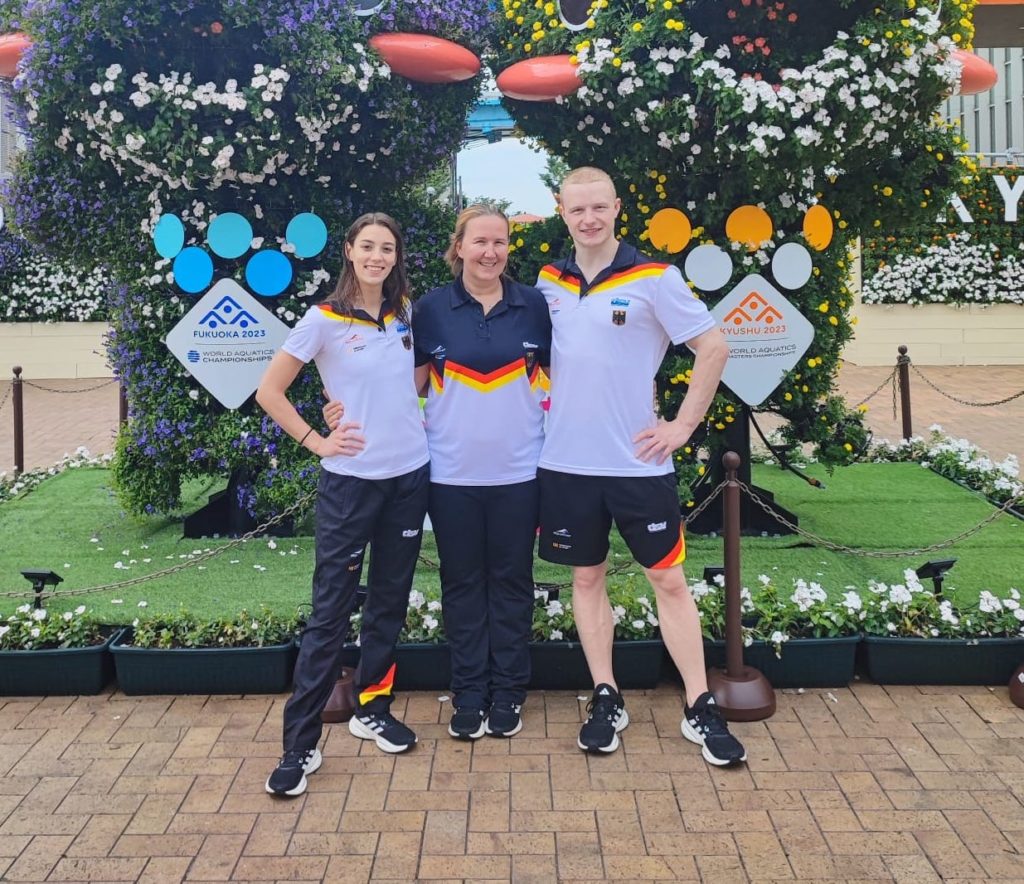
IS: Michelle Zimmer, your mixed duet partner since 2020, recently announced her retirement. How did you take the news, and what’s next for you?
FS: She openly talked about her retirement with our coach and me soon after her decision. Knowing in advance that the World Championships in Fukuoka would be our last international competition together helped me cope with the news and enjoy the event even more. Nevertheless, I still remember this particular moment, having Marlene [Bojer] and our friends from the Serbian and Belgian mixed duets around, and crying like a child when I realized that this constellation would never occur again.
As for the future, right now, I need some time to figure out what I actually want in life. I will still be part of the national team in 2024 though.
IS: Do you have a favorite competition or any particular memory you’d like to share?
FS: I really loved watching Michelle swim solo. These are the moments when I realized why I fell in love with the sport. She has the ability to transport emotions in a way that I can really connect with.
Another important moment to me was when I was told that I was allowed to participate in the 2022 European Championships. At that time, Marlene and Michelle were in Budapest for the World Championships, and I was in Berlin. After my training session while I was still at the pool with my coach, we had a call with them. Then, they told me that I would be competing in Rome. We were all crying from happiness and pride.
IS: Is there anyone you’d consider a role model or an inspiration in artistic swimming?
FS: I know it is cheesy, but I drew a lot of motivation from what Michelle and Marlene have achieved as a duet. The way they managed to overcome obstacle after obstacle inspired me a lot. Considering the athletic aspect, I love watching the Alexandri triplets perform.
IS: Can you tell me a bit more about life outside of the pool?
FS: Currently, I am working on my Bachelor’s thesis as an engineer at a company that develops sports equipment for the German Olympic Sports Confederation. After that, I will continue with a Master’s Degree in aeronautics and astronautics.
IS: Is there anything else you’d like to say to the community or to younger artistic swimmers?
FS: Bad days are an essential part of the process of becoming better in what you do – cherish them! If you keep going even though you are having a bad day, you are doing everything right.
ARTICLE BY CHRISTINA MARMET
All photos courtesy of Frithjof Seidel.
If you’ve enjoyed our coverage, please consider donating to Inside Synchro! Any amount helps us run the site and travel costs to cover meets during the season.

